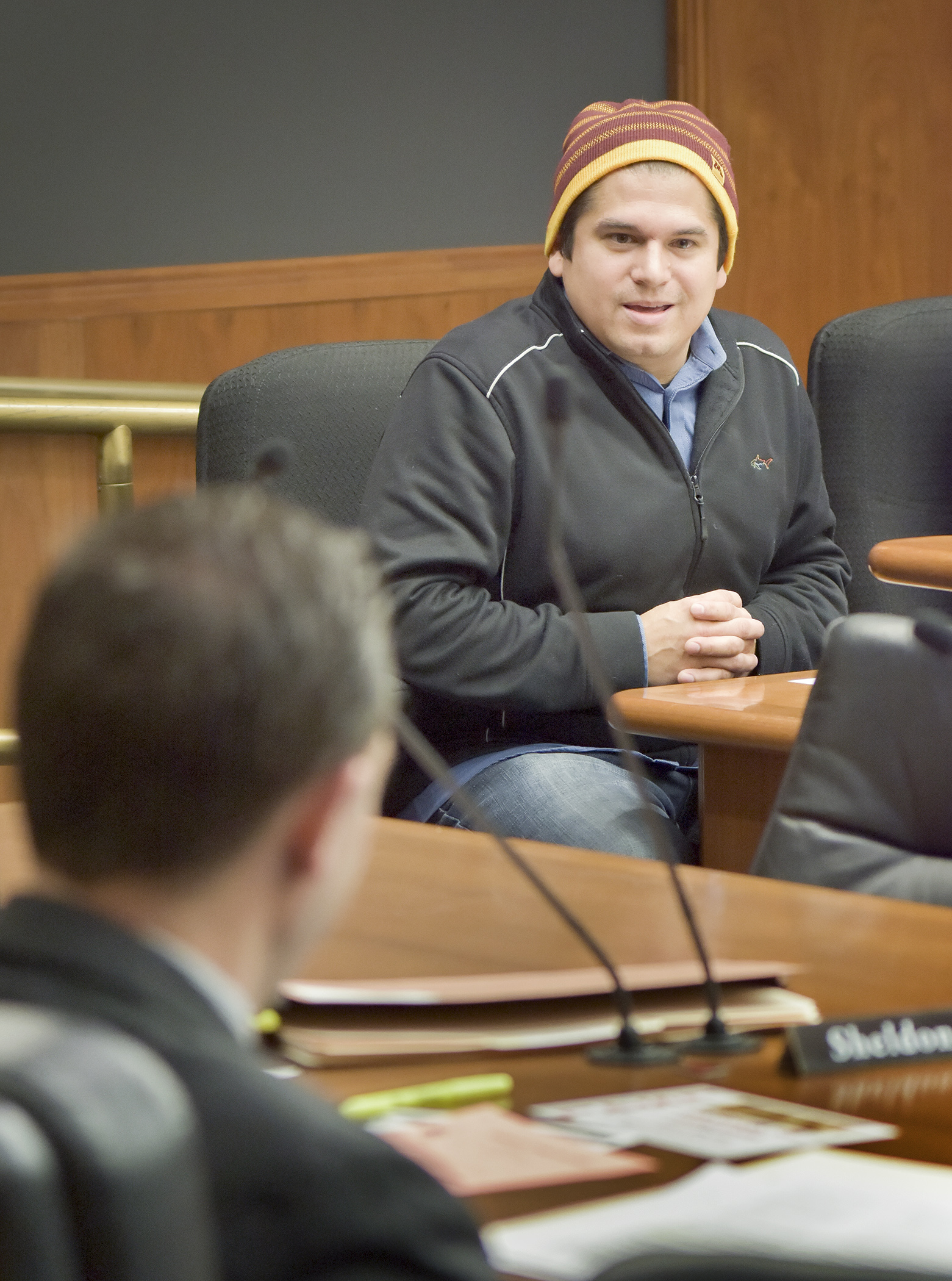Legislators take aim at GPS feature on ignition-interlock devices
Minnesota’s ignition-interlock program could lose a geolocation feature that has drawn criticism.
About 10,000 Minnesotans currently opt to participate in the program, Public Safety Commissioner Mona Dohman told the House Civil Law and Data Practices Policy Committee, by blowing into devices that detect alcohol in order to start their vehicles.
Rep. Peggy Scott (R-Andover), the committee chairwoman, said Thursday she is preparing a bill that would ban the devices from tracking movements of participants, and also end an exemption letting the Public Safety Department make program rules without legislative approval.
 Nick Quade of New Brighton testifies before the House Civil Law and Data Practices Policy Committee Jan. 5 during a Department of Public Safety presentation on the Ignition Interlock Real Time Reporting Rule. Photo by Andrew VonBank
Nick Quade of New Brighton testifies before the House Civil Law and Data Practices Policy Committee Jan. 5 during a Department of Public Safety presentation on the Ignition Interlock Real Time Reporting Rule. Photo by Andrew VonBankThe Legislature started ignition interlock as a pilot program in 2007, expanded it statewide in 2009 and made it a regular program in 2010.
Dohman said her agency doesn’t gather, and has no interest in, or access to, participants’ location data. Rather, device manufacturers added GPS along with real-time reporting, a feature the agency does want that she said has sped up ignition-interlock notifications from 30 days to 24 hours.
Dawn Olson, who leads the department’s Driver and Vehicle Services Division, said immediate sanctions that real-time reporting allows reduce recidivism.
But Scott expressed concern that geolocation tracking might turn off prospective participants. “These people did not sign up for that,” she said. That concern could be greatest for women seeking to avoid a stalker or an abusive ex.
Nick Quade participates in the ignition interlock program. He told the committee he asked the vendor of his device whether they are tracking his movements and was told no.
Rep. John Lesch (DFL-St. Paul) said the department should have asked legislators for a more restrictive data classification before allowing vendors to add geolocation. Without a reclassification, he said, geolocation data held by vendors is public government data.
Charles Clippert, president of the Minnesota Association of Criminal Defense Lawyers, said even if legislators reclassify participants’ geolocation data under the state’s data privacy act, the data could still become public in court by subpoena.
Deputy Commissioner Cassandra O’Hern said the department would comply with a Dec. 29 district court order that the agency stop enforcing the real-time reporting requirement pending resolution of the constitutionality question.
Related Articles
Search Session Daily
Advanced Search OptionsPriority Dailies
Ways and Means Committee OKs proposed $512 million supplemental budget on party-line vote
By Mike Cook Meeting more needs or fiscal irresponsibility is one way to sum up the differences among the two parties on a supplemental spending package a year after a $72 billion state budg...
Meeting more needs or fiscal irresponsibility is one way to sum up the differences among the two parties on a supplemental spending package a year after a $72 billion state budg...
Minnesota’s projected budget surplus balloons to $3.7 billion, but fiscal pressure still looms
By Rob Hubbard Just as Minnesota has experienced a warmer winter than usual, so has the state’s budget outlook warmed over the past few months.
On Thursday, Minnesota Management and Budget...
Just as Minnesota has experienced a warmer winter than usual, so has the state’s budget outlook warmed over the past few months.
On Thursday, Minnesota Management and Budget...